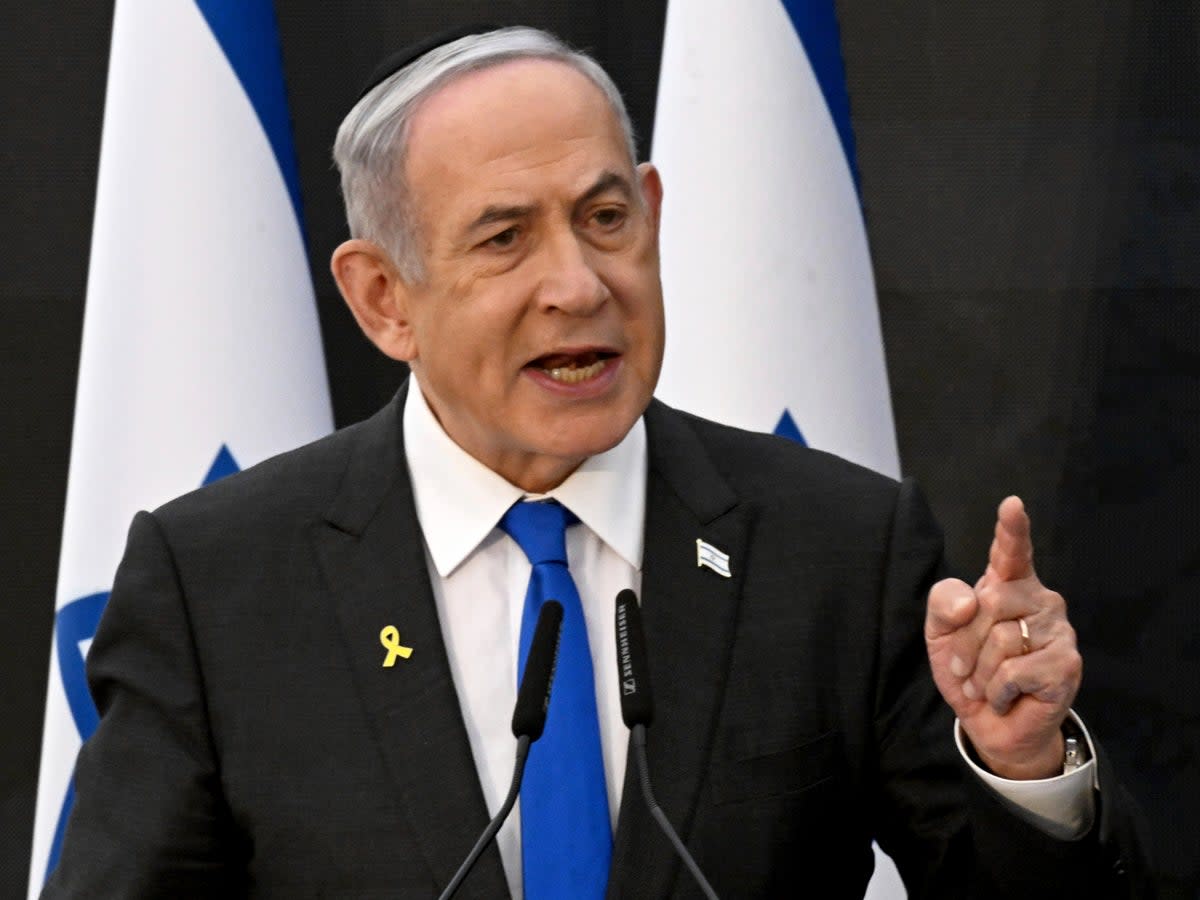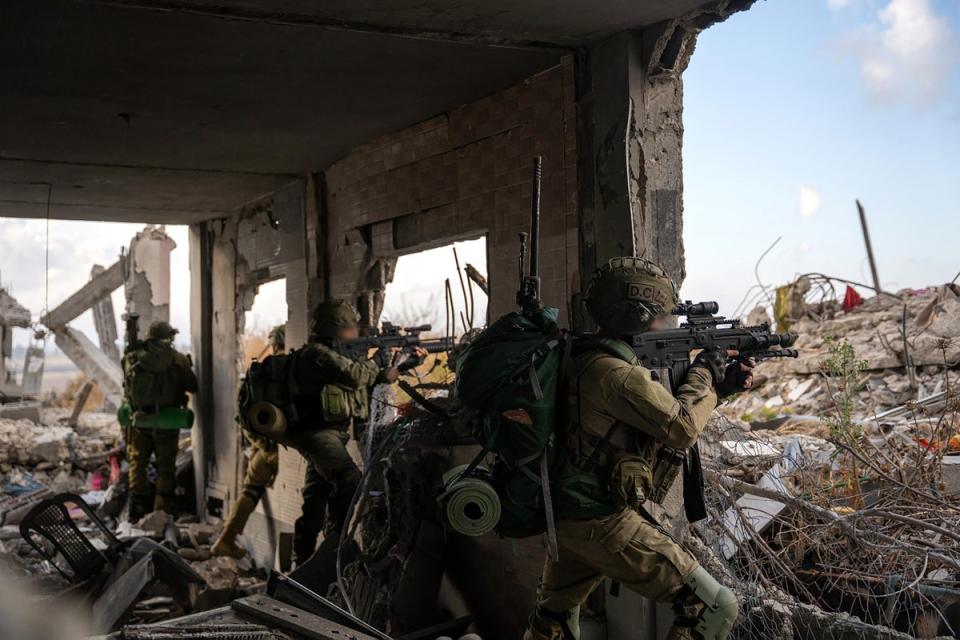Israel’s defence minister hits out at Netanyahu over post-war Gaza plan

Israel’s defence minister Yoav Gallant has publicly hit out at prime minister Benjamin Netanyahu’s plans for a post-war Gaza – vowing to oppose any long-term military rule by Israel.
Pressure has been growing on Mr Netanyahu for weeks over Israel’s conduct in Gaza, with the international community calling for a ceasefire and even staunch ally the US baulking at a full-scale assault on the border city of Rafah, where more than 1 million Palestinians are sheltering. The Israeli prime minister claims the offensive is crucial to eliminating Hamas. Mr Netanyahu’s attempts to keep his hardline government coalition partners onside in promising an attack on Rafah is said to have caused splits in the country’s war cabinet, with these bursting into the open with Mr Gallant’s remarks.
Israel launched its heaviest-ever bombardment of Gaza, plus a ground assault and a blockade, in retaliation for a bloody attack by Hamas on 7 October during which around 1,200 people were killed and another 250 were taken hostage, including toddlers. Since then, Palestinian health workers in the Hamas-run territory say Israel’s bombardment has killed at least 35,000 Palestinians, the majority of whom were women and children.
In a televised news conference, Mr Gallant said that, since soon after the conflict erupted with a shock Hamas attack on 7 October, he had tried to promote a blueprint for an alternative Gaza administration made up of Palestinians. Those efforts “got no response” from various decision-making cabinet forums under Mr Netanyahu, said Mr Gallant, who comes from the prime minister’s Likud Party.
“I call on the prime minister to announce that Israel will not rule over Gaza militarily,” Mr Gallant said. “An alternative to Hamas governance should be established ... Indecision will erode the military gains [of the war].” Fellow war cabinet member Benny Gantz voiced support for Mr Gallant, saying he “spoke the truth”.
“The responsibility of leadership is to do right thing for the country, at any price,” Mr Gantz added.
Mr Netanyahu has said Israel, if it achieves its war goal of dismantling Hamas’ government and military apparatus in Gaza, would retain overall security control over the territory. He has stopped short of describing this scenario as an occupation.
In a video statement issued after Mr Gallant’s remarks, Mr Netanyhu said that any move to establish an alternative to Hamas as the government of Gaza required that the militants first be eliminated, and demanded this goal be pursued “without excuses”.
The Israeli military has in recent days pressed into the east of Rafah in pursuit of what it says are four Hamas battalions, despite warnings from its allies including the US and the UK to hold off to avoid mass civilian casualties.
Rafah residents said Israeli forces had pushed into three neighbourhoods and Palestinian gunmen were trying to prevent soldiers and tanks moving towards the centre.
Israel said its troops targeted a training compound, killing militants in close-quarters combat and finding many weapons.
Earlier on Wednesday, in an interview broadcast by CNBC, Mr Netanyahu said he hoped to overcome differences with US President Joe Biden and receive $1bn (£790m) in military aid from Washington as he said an operation in Rafah could take weeks.
The latest US weapons package, revealed by anonymous sources in the US state department, is currently under congressional review. Critics say if the package is passed, it would undermine the opposition expressed by Mr Biden last week when he suspended a weapons shipment to Israel and warned Mr Netanyahu against an invasion of Rafah.
Asked in a CNBC interview that aired on Wednesday if he could confirm the $1bn package movement, Mr Netanyahu declined to say but added that he appreciates US assistance.
“Yes, we do have a disagreement on Gaza. Rather, on Rafah. But we have to do what we have to do,” Mr Netanyahu told CNBC’s Sara Eisen. “And, you know, sometimes you have to ... you just have to do what is required to ensure your survival and your future. We cannot continue into the future by having Hamas retake Gaza.”
The latest arms deal allows for the potential transfer of $700m in tank ammunition, $500m in tactical vehicles and $60m in mortar rounds, the anonymous officials said.
The package, suspended last week, included 1,800 900kg bombs. Jake Sullivan, Mr Biden’s national security adviser, said on Monday that they paused the shipment because they “do not believe [the bombs] should be dropped in densely populated cities”.
In the same press briefing, however, he added that the US was “continuing to send military assistance” to Israel.

In the north of Gaza, Israel said it had concluded an operation in the Zeitoun area, killing “dozens of terrorists”. Residents said tanks had pulled back from the area, with dozens of homes destroyed or damaged, while Palestinian medics said dozens of civilians had been killed and wounded.
US secretary of state Antony Blinken, meanwhile, reiterated calls from the Biden administration for Israel to have a clear and concrete plan for the future of Gaza where it faces the potential for a power vacuum that could become filled by chaos.
“We do not support and will not support an Israeli occupation,” Mr Blinken said during a visit to the Ukrainain capital of Kyiv. “We also, of course, do not support Hamas governance in Gaza ... We’ve seen where that’s led all too many times for the people of Gaza and for Israel. And we also can’t have anarchy and a vacuum that’s likely to be filled by chaos.”
The US’ top diplomat has held numerous talks with Israel’s Arab neighbours on a post-conflict plan for Gaza since Israel vowed to root out Hamas from the Palestinian enclave more than seven months ago.
But Israel says it intends to keep overall security control and has baulked at proposals for the Palestinian Authority, which governs with partial authority in the Israeli-occupied West Bank, to take charge.
“It’s imperative that Israel also do this work and focus on what the future can and must be,” Mr Blinken said. “There needs to be a clear and concrete plan, and we look to Israel to come forward with its ideas.”


